|
|
|
Sort Order |
|
|
|
Items / Page
|
|
|
|
|
|
|
| Srl | Item |
| 1 |
ID:
120000
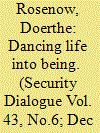

|
|
|
|
|
| Publication |
2013.
|
| Summary/Abstract |
A variety of scholars in critical security studies have recently argued that new modes of neoliberal world order are influenced by the emergence of complexity theory in the sciences, which manifests itself, for example, in the discourse of resilience. By contrast, this article aims to point at the number of governmental discourses and practices in which 'old' understandings of order are persistent. What will be argued is that such a set of practices can be found in the regulation of genetically modified organisms (GMOs), in which the dominant approaches and strategies still rely on an understanding of life that is bound to a more traditional episteme that expresses the desire for predictable management with clearly controllable effects. The article then moves on to discourses of resilience to show how they are equally characterized by this episteme. In unravelling the struggle that exists between 'old' and 'new' epistemes, the article aims to elaborate on the potential of complexity discourses for challenging particular governmental rationales, manifested in both the resilience context and the GMO controversy.
|
|
|
|
|
|
|
|
|
|
|
|
|
|
|
|
| 2 |
ID:
119999
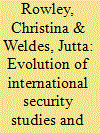

|
|
|
|
|
| Publication |
2012.
|
| Summary/Abstract |
Security studies is again reflecting on its origins and debating how best to study in/security. In this article, we interrogate the contemporary evolutionary narrative about (international) security studies. We unpack the myth's components and argue that it restricts the empirical focus of (international) security studies, limits its analytical insights, and constrains the sorts of interlocutors with whom it engages. We then argue that these limitations can at least partially be remedied by examining the performance of identities and in/securities in everyday life. In order initially to establish the important similarities between (international) security studies and the everyday, we trace elements of the evolutionary myth in Buffy the Vampire Slayer and Angel - which both stand in for, and are, the everyday in our analysis. We then argue that the Buffyverse offers a complex understanding of (identities and) in/security as a terrain of everyday theorizing, negotiation and contestation - what we call the 'entanglement' of in/security discourses - that overcomes the shortcomings of (international) security studies and its myth, providing insights fruitful for the study of in/security. In conclusion, we briefly draw out the implications of our analysis for potential directions in (international) security studies scholarship and pedagogy.
|
|
|
|
|
|
|
|
|
|
|
|
|
|
|
|
| 3 |
ID:
120002
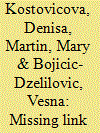

|
|
|
|
|
| Publication |
2013.
|
| Summary/Abstract |
The concept of human security continues to defy definitional clarity at the same time as it is being embraced by policymakers. This article proposes a practice-grounded approach that focuses on investigative method as a way of linking conceptual understanding of human security to the research process. Probing the 'actorness' of individuals in volatile contexts, a study of insecurity in Kosovo shows how dialogue can be applied as a research tool to access and assess human security in the field. Dialogue permits recognition of the power of the researched in the construction of knowledge of security, and accordingly reflects the conceptual shift represented by human security from states to communities and individuals. In the Kosovo study, dialogic research captured individual agency in the face of pervasive insecurity and revealed contradictory effects of such agency. This led to the formulation of the idea of the multidirectional security marker as a means of understanding experiences of insecurity in relation to strategies to combat it. Three such markers - self-reliance, informality and community solidarity - emerged and are analysed in the case of Kosovo. Simultaneously denoting restrictions on people's security and possibilities for overcoming those very same limitations, the markers express the agential dimension of human security and show how agency and security interact.
|
|
|
|
|
|
|
|
|
|
|
|
|
|
|
|
| 4 |
ID:
119998
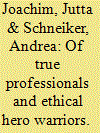

|
|
|
|
|
| Publication |
2012.
|
| Summary/Abstract |
Private military and security companies (PMSCs) have gained increasingly in importance over the course of the past two decades. Yet, given the intransparency of the industry and the heterogeneity of the companies that comprise it, we thus far know little about the actors involved. In this article, we offer preliminary insights into the self-representation of PMSCs, based on a gender-discourse analysis of the homepages of select companies and their main professional associations. We argue that survival in an increasingly competitive industry not only hinges on size, market share or effectiveness, but is also inherently gendered. PMSCs and their associations draw on the one hand on civilized and accepted forms of masculinity and femininity, presenting themselves as 'highly skilled professional' military strategists and ordinary businesses akin to banks or insurance companies. At the same time, however, PMSCs also engage in strategies of (hyper)masculinization and pathologization to set themselves apart from mercenaries, their private competitors and state security forces. In this respect, companies appear to view themselves as 'ethical hero warriors'. Whether intended or not, their strategies have political consequences. Within the security industry, they contribute to the creation and maintenance of a norm regarding what constitutes a legitimate PMSC, to which more or less all companies strive to adhere. Vis-à-vis other security actors, these strategies seek to establish PMSCs as being superior because, unlike these actors, such companies are super-masculine and able to live up to the growing and sometimes contradictory demands of changing security contexts.
|
|
|
|
|
|
|
|
|
|
|
|
|
|
|
|
| 5 |
ID:
120001
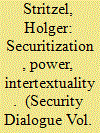

|
|
|
|
|
| Publication |
2013.
|
| Summary/Abstract |
While a range of recent accounts have suggested developing a more contextualist conceptualization of securitization theory, few analyses have actually provided detailed operationalizations of the interplay of language, power and context in securitizations. By suggesting and specifying a way of analysing securitizing moves in relation to intertextual linkages with popular culture, this article examines such interplay in processes of securitization. In doing so, the article not only suggests a contextualist operationalization of securitization theory but also hopes to contribute to studies on discourse, intertextuality and pop culture in international relations more generally.
|
|
|
|
|
|
|
|
|
|
|
|
|
|
|
|
|
|
|
|
|